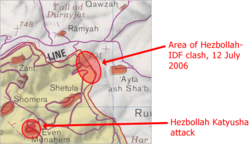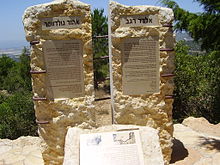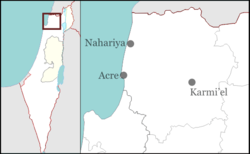- 2006 Hezbollah cross-border raid
-
2006 Hezbollah cross-border raid 
Location Lebanon–Israel border Coordinates 33°6′1.34″N 35°19′11.8″E / 33.1003722°N 35.319944°E Date July 12, 2006
Around 9:00 am (GMT+2)Attack type Shooting attack, Kidnapping Death(s) 3 Israeli soldiers killed
2 of the corpses kidnappedPerpetrator(s) Hezbollah The 2006 Hezbollah cross-border raid was a cross-border attack committed by Lebanon-based Hezbollah militants on an Israeli military patrol on 12 July 2006 on Israeli territory.
Using rockets fired on several Israeli towns as a diversion; Hezbollah militants crossed from Lebanon into Israel [1] and ambushed two Israeli Army vehicles, killing five soldiers and capturing the bodies of two of the soldiers. Another five soldiers were killed in a failed rescue attempt. Hezbollah demanded the release of Lebanese prisoners held by Israel in exchange for the release of the abducted soldiers. Israel refused and launched a large-scale military campaign across Lebanon in response to the Hezbollah incursion. This marked the start of the 2006 Lebanon War. Two years later, on July 16, 2008, the bodies of the two abducted soldiers were returned to Israel by Hezbollah in exchange for Samir Kuntar and four Hezbollah prisoners.
Hezbollah originally named the cross-border operation "Freedom for Samir Al-Quntar and his brothers", but eventually shortened it to "Operation Truthful Promise".[2]
Contents
Planning phase
See also: 2000–2006 Shebaa Farms conflictOn November 21, 2005, Hezbollah guerrillas infiltrated northern Israel in what Israel said was an attempt to kidnap soldiers. Four Hezbollah fighters were killed, and in response, Israel launched air strikes and artillery at Hezbollah positions in southern Lebanon. During the brief clash, Hezbollah also launched rockets at towns in northern Israel.[3][4]
On May 28, 2006, less than two months before the Lebanon War began, Hezbollah fired rockets into northern Israel in response to the killing in Lebanon of Mahmoud al-Majzoub. Israel retaliated by launching air strikes on Hezbollah bases in Lebanon and firing artillery across the border. The fighting was described as the most intense since the Israeli withdrawal in 2000, though it was over quickly due to a UN-sponsored cease fire.[5]
In the months leading up to the July 12 attack, Lt. Col. Ishai Efroni reported seeing increased activity across the fenceline, including more brazen Hezbollah patrols. He had repeatedly seen burden-laden donkeys, which he had believed were being led by innocent farmers, but after the incident suspected were laden with arms and equipment. After the May 28 rocket attack, the colonel, who at 41 had spent much of his career along the northern border, "got the feeling something had changed."[6]
Hezbollah had carved a hollow from the underbrush, just above the Israeli border patrol track. The "camp was stocked with food, water, radios, rifles, antitank missiles and diagrams detailing the insignia and size of Israeli military units."[6]
The attack
At around 9:00 a.m. local time (06:00 UTC), on 12 July 2006, Hezbollah initiated diversionary Katyusha rocket and mortar attacks on Israeli military positions and border villages, including Zar'it and Shlomi. Five civilians were wounded[7][8][9][10][11][12]
A ground contingent of Hezbollah fighters crossed the border into Israeli territory, taking advantage of a "dead zone" in the border fence not visible from any of the IDF lookout posts, and may have used a wheeled ladder to climb the fence.[7] They hid in a wadi on the Israeli side of the fence, and attacked two Israeli armored Humvees with a combination of pre-positioned explosives and anti-tank missiles as they were patrolling on the Israeli side of the Israel-Lebanon border between the villages of Zar'it and Shtula. The team knocked out the trailing Humvee, killing three soldiers inside, and captured the bodies of two soldiers from the first vehicle.[6] Another soldier was severely wounded, another lightly wounded and a third was scratched by shrapnel. The entire incident took no more than 10 minutes.[7]
At the same time, Hezbollah fighters fired on seven army posts, knocking out surveillance cameras and command communications with the convoy. Twenty minutes passed until Staff Sgts. Ehud Goldwasser, 31, and Eldad Regev, 26, were confirmed to be missing from the first vehicle. The Hezbollah fighters then escaped through olive orchards to the Lebanese border village of Aita al-Shaab.[6]
Lt. Col. Ishai Efroni, deputy commander of the Baram Brigade, sent a Merkava Mark II tank, an armored personnel carrier and a helicopter in pursuit.[6] Crossing into Lebanon,[13] they headed down a dirt track lined with Lebanese border defenses.[6] However, they veered onto a road near a known Hezbollah outpost along the border. The tank was destroyed by an IED with an estimated 200-300 kilograms of explosives, killing the crew of four.[6][14] One soldier was killed and two were lightly wounded by mortar fire as they attempted to recover the bodies.
Location controversy
Israel, the UN,[15][16] the EU,[17] the G8,[18] the US,[19] and prominent news agencies,[8][20][21][22][23] including Al Jazeera,[24] have characterized the Hezbollah action as "cross-border" (and therefore an act of war under international law), although allegedly the Lebanese police, and later Hezbollah, stated that the Israeli soldiers were abducted on the Lebanese side of the border "during a mission to infiltrate the town of Ayta ash-Shab."[25]
Aftermath
 A monument in the Adamit Park, in memory of two of the victims in the attack - Eldad Regev and Ehud Goldwasser
A monument in the Adamit Park, in memory of two of the victims in the attack - Eldad Regev and Ehud Goldwasser
The IDF confirmed the capture of the two Israeli soldiers on 13 July. They were both reservists on their last day of operational duty.[26]
Hezbollah released a statement saying "Implementing our promise to free Arab prisoners in Israeli jails, our strugglers have captured two Israeli soldiers in southern Lebanon."[27] Later on, Hassan Nasrallah declared that "No military operation will return them…[t]he prisoners will not be returned except through one way: indirect negotiations and a trade of prisoners."[28]
The incident prompted the start of the 2006 Lebanon War. Israel responded with airstrikes and artillery shelling of Hezbollah targets, and a naval blockade against Lebanon, followed by a ground invasion. After 34 days of fighting, a cease-fire came into effect. During the war, Israeli forces took 13 Hezbollah fighters prisoner, and captured the bodies of dozens more.
On 6 August the IDF announced one of the Hezbollah participants was captured in a commando operation.[29]
On 27 August the Hezbollah chief Sheikh Hassan Nasrallah has said he would not have ordered the abduction of two Israeli soldiers if he had known it would lead to such a war. "Had we known that the kidnapping of the soldiers would have led to this, we would definitely not have done it," he said in an interview on Lebanese TV.[30] On the other side, however; Israeli P.M. Ehud Olmert testified before the Winograd Commission that he had fully planned for an intensive war upon a kidnapping as early as March.[31]
Nasrallah stated on 31 October 2006 that indirect talks with Israel on hostage return had begun.[32]
Haaretz reported in March 2007 that Prime Minister Ehud Olmert testified to the Winograd Commission that several meetings regarding Hezbollah were held upon his taking office, and that in response to the likely scenario of soldiers again being abducted, he chose one of several plans of action instead of having to make a snap-judgement if and when such a scenario occurred.[33]
On 6 December 2006, a previously classified report released by Israel stated that the two soldiers were critically wounded during the abduction.[34][35][36][37]
On June 29, 2008, Prime Minister Ehud Olmert declared the two captives dead. On July 16, 2008 Hezbollah swapped the bodies of Ehud and Eldad for Samir Kuntar, four Hezbollah prisoners captured during the 2006 Lebanon war, and the bodies of 199 killed Palestinian and Lebanese fighters.
See also
External links
- 3 Israeli Soldiers Die in Hezbollah Raid - published on the Washington Post on July 12, 2006
- Hezbollah Captures Two Israeli Soldiers - published on NPR on July 12, 2006
- Israelis Enter Lebanon After Attacks - published on the New York Times on July 13, 2006
- Hezbollah attacks northern Israel and Israel's response 12-Jul-2006 - published at the Israeli Ministry of Foreign Affairs
References
- ^ Myre, Greg; Erlanger, Steven (2006-07-13). "Clashes Spread to Lebanon as Hezbollah Raids Israel". The New York Times. http://www.nytimes.com/2006/07/13/world/middleeast/13mideast.html?hp&ex=1152849600&en=7c501785edb16cc8&ei=5094&partner=homepage.
- ^ "Press Conference with Hasan Nasrallah". UNDERSTANDING THE PRESENT CRISIS. UPC. 12 July 2006. Archived from the original on 2006-11-17. http://web.archive.org/web/20061117204541/http://www.upc.org.uk/hasann12jul06.html. Retrieved 2006-11-13. (Link is dead but available via the Internet Archive [1] [2])
- ^ O'Loughlin, Ed (2005-11-23). "Israel, Hezbollah blame each other for clash". The Age (Melbourne). http://www.theage.com.au/news/world/israel-hezbollah-blame-each-other-for-clash/2005/11/22/1132421666090.html.
- ^ http://www.newsday.com/news/nationworld/world/ny-woleba224523762nov22,0,2969932.story?coll=ny-worldnews-headlines[dead link]
- ^ Myre, Greg; Fattah, Hassan M. (2006-05-29). "Israel and Militants Trade Fire Across Lebanese Border". The New York Times. http://www.nytimes.com/2006/05/29/world/middleeast/29mideast.html?_r=1&oref=slogin.
- ^ a b c d e f g Wilson, Scott (2006-10-21). "Israeli War Plan Had No Exit Strategy: Forecast of 'Diminishing Returns' in Lebanon Fractured Unity in Cabinet". Jerusalem: Washington Post. http://www.washingtonpost.com/wp-dyn/content/article/2006/10/20/AR2006102001688.html. Retrieved 21 October 2006.
- ^ a b c Harel, Amos (July 13, 2006). "Hezbollah kills 8 soldiers, kidnaps two in offensive on northern border". Haaretz. http://www.haaretz.com/hasen/pages/ShArt.jhtml?itemNo=737825. Retrieved 2006-08-13.
- ^ a b "Hezbollah Raid Opens 2nd Front for Israel". The Washington Post. July 13, 2006. http://www.washingtonpost.com/wp-dyn/content/article/2006/07/12/AR2006071200262_pf.html. Retrieved 2006-08-18.
- ^ Hezbollah Captures Two Israeli Soldiers
- ^ Clashes spread to Lebanon as Hezbollah raids Israel - International Herald Tribune
- ^ חדשות nrg - חיזבאללה: חטפנו שני חיילים, שחררו אסירים
- ^ "Day-by-day: Lebanon crisis - week one". BBC. July 19, 2006. http://news.bbc.co.uk/2/hi/middle_east/5179434.stm.
- ^ Harel, Amos; Jack Khoury (July 14, 2006). "IDF retrieves bodies of four tank soldiers killed in south Lebanon". Haaretz. http://www.haaretz.com/hasen/spages/738310.html. Retrieved 2006-08-13.
- ^ "IDF retrieves bodies of four tank soldiers killed in south Lebanon". Haaretz. 2006-07-14. http://www.haaretz.com/hasen/spages/738310.html. Retrieved 2006-07-16.
- ^ "Hezbollah kidnaps two Israeli soldiers". United Press International. 2006-07-12. http://www.upi.com/InternationalIntelligence/view.php?StoryID=20060712-045210-4262r.
- ^ "Security Council 5489th Meeting". United Nations. 2006-07-14. http://www.un.org/News/Press/docs/2006/sc8776.doc.htm.
- ^ "2744th Council Meeting, General Affairs and External Relations External Relations, MIDDLE EAST Council conclusions". European Council. 2006-07-18. http://europa.eu/rapid/pressReleasesAction.do?reference=PRES/06/219&format=HTML&language=EN#_Toc141676044.
- ^ "Middle East". 2006-07-16. Archived from the original on 2009-03-13. http://en.g8russia.ru/docs/21.html.
- ^ "Statement on Condemnation of Hizballah Kidnapping of Two Israeli Soldiers". Statement of the White House. 2006-07-12. http://www.whitehouse.gov/news/releases/2006/07/20060712.html.
- ^ "U.N. chief calls for immediate cease-fire". CNN. 2006-07-21. Archived from the original on August 14, 2006. http://web.archive.org/web/20060814002635/http://edition.cnn.com/2006/WORLD/meast/07/20/mideast.diplomacy/index.html.
- ^ "Hezbollah warns Israel over raids". BBC. 2006-07-12. http://news.bbc.co.uk/2/hi/middle_east/5173078.stm.
- ^ "Hezbollah Captures 2 Israeli Soldiers". CBS. 2006-07-12. http://www.cbsnews.com/stories/2006/07/12/ap/world/mainD8IQFLNG6.shtml.[dead link]
- ^ Myre, Greg; Erlanger, Steven (2006-07-13). "Clashes Spread to Lebanon as Hezbollah Raids Israel". The New York Times. http://www.nytimes.com/2006/07/13/world/middleeast/13mideast.html?hp&ex=1152849600&en=7c501785edb16cc8&ei=5094&partner=homepage.
- ^ "Lebanon divided over Hezbollah raid". Al Jazeera. 2006-07-14. http://english.aljazeera.net/NR/exeres/8CEC68E6-3CEF-4E1B-907B-EF4B8F4D5585.htm.
- ^ "Hezbollah captures two Israeli soldiers". Yahoo news: India. July 12, 2006. http://in.news.yahoo.com/060712/43/65tzi.html. Retrieved 2006-08-13.[dead link]
- ^ "Kidnapped soldier's kin: Stop the killing". CNN. 2006-07-21. http://www.cnn.com/2006/WORLD/meast/07/20/kidnapped.soldiers/index.html.
- ^ "Hezbollah captures two Israeli soldiers". 2006-07-12. http://www.newkerala.com/news3.php?action=fullnews&id=21653.
- ^ "Hizbullah leader calls for prisoner exchange". Archived from the original on January 24, 2007. http://web.archive.org/web/20070124184814/http://www.albawaba.com/en/countries/Palestine/200711.
- ^ "IDF says holding soldiers' abductor; 3 soldiers hurt in Lebanon". Haaretz. 2006-08-06. http://www.haaretz.com/hasen/spages/746939.html.
- ^ "Nasrallah sorry for scale of war". BBC News. 2006-08-27. http://news.bbc.co.uk/2/hi/middle_east/5291420.stm. Retrieved 1 November 2006.
- ^ PM: War planned months in advance - Haaretz Daily Newspaper | Israel News
- ^ "Hezbollah confirms Israel talks", BBC News, 1 November 2006
- ^ Aluf Benn (March 8, 2007). "PM: War planned months in advance". Haaretz. http://www.haaretz.com/hasen/spages/834549.html. Retrieved 2007-05-09.
- ^ Robert Berger (December 6, 2006). "Captured Israeli soldiers may be dead". CBS News. http://www.cbsnews.com/stories/2006/12/06/world/main2233993.shtml. Retrieved 2007-05-09.
- ^ Tovah Lazaroff (December 5, 2006). "EU envoy: No proof that Eldad and Goldwasser are alive". Jerusalem Post. http://fr.jpost.com/servlet/Satellite?cid=1164881826613&pagename=JPost/JPArticle/ShowFull. Retrieved 2007-05-09.
- ^ "Olmert: No Hezbollah prisoner swap if Israelis dead - report". Reuters. December 1, 2006. http://thestar.com.my/news/story.asp?file=/2006/12/1/worldupdates/2006-12-01T130226Z_01_NOOTR_RTRJONC_0_-278538-1&sec=Worldupdates. Retrieved 2007-05-09.
- ^ Jack Khoury; Assaf Uni (November 29, 2006). "Red Cross: No signs of life from abducted IDF troops in Lebanon". Haaretz. http://haaretz.com/hasen/spages/793999.html. Retrieved 2007-05-09.
Prominent terrorist attacks against Israeli targets in the history of the Arab–Israeli conflict – the 2000s 2000 2001 Murder of Ofir Rahum (January 17) – Netanya bombing (March 4) – Murder of Shalhevet Pass (March 26) – Murder of Koby Mandell and Yosef Ishran (May 8) – 1st HaSharon Mall entrance suicide bombing (May 18) – Dolphinarium discotheque suicide bombing (June 1) – Sbarro restaurant suicide bombing (August 9) – Nahariya train station suicide bombing (September 9) – Assassination of the Israeli Minister of Tourism Rehavam Ze'evi (October 17) – Egged bus 823 bombing (November 29) – Ben Yehuda Street Bombings (December 1) – Haifa bus 16 suicide bombing (December 2) – Immanuel bus attack (December 12)2002 Bat Mitzvah massacre (January 18) – Tel Aviv outdoor mall bombing (January 25) – Jaffa Street bombing (January 27) – Karnei Shomron Mall suicide bombing (February 16) – Yeshivat Beit Yisrael massacre (March 2) – Café Moment bombing (March 9) – Matzuva attack (March 12) – Egged bus 823 bombing (March 20) – King George Street bombing (March 21) – Passover massacre (March 27) ‡ – Kiryat HaYovel supermarket bombing (March 29) – Matza restaurant suicide bombing (March 31) – Yagur Junction bombing (April 10) – Mahane Yehuda Market bombing (April 12) – Rishon LeZion bombing (May 7) – Netanya Market bombing (May 19) – Pi Glilot bombing (May 23) – Megiddo Junction bus bombing (June 5) – Herzliya shawarma restaurant bombing (June 11) – Patt Junction Bus Bombing (June 18) – French Hill Junction massacre (June 19) – Itamar attack (June 20) – Immanuel bus attack (July 16) – Neve Shaanan Street bombing (July 17) – Hebrew University massacre (July 31) – Meron Junction Bus 361 attack (August 4) – Allenby Street bus bombing (September 19) – Karkur junction suicide bombing (October 21) – Sonol gas station bombing (October 27) – Hebron ambush (November 15) – Kiryat Menachem bus bombing (November 21) – Mombasa attacks (November 28) – Beit She'an attack (November 28)2003 Tel-Aviv central bus station massacre (January 5) – Haifa bus 37 suicide bombing (March 5) – Mike's Place suicide bombing (April 30) – Jerusalem bombings (May 18) – Afula mall bombing (May 19) – Davidka Square bus bombing (June 11) – Murder of Oleg Shaichat (July 28) – Shmuel HaNavi bus bombing (August 19) – Tzrifin bus stop attack (September 9) – Café Hillel bombing (September 9) – Maxim restaurant suicide bombing (October 4) – Geha Interchange bus stop bombing (December 25)2004 Erez Crossing bombing (January 14) – Gaza Street bus bombing (January 29) – Liberty Bell Park bus bombing (February 22) – Ashdod Port bombings (March 14) – Murder of Tali Hatuel and her four daughters (May 2) – Tashkent Israeli embassy bombing (July 30) – Beersheba bus bombings (August 31) – Sinai bombings (October 7) – Carmel Market bombing (November 1)2005 Karni border crossing attack (January 13) – Stage Club bombing (February 25) – 2nd HaSharon Mall entrance suicide bombing (July 12) – Shfar'am attack (August 4) – Hadera Market bombing (October 26) – 3rd HaSharon Mall entrance suicide bombing (December 5)2006 Kedumim bombing (March 30) – Tel Aviv shawarma restaurant bombing (April 17) – Hamas cross-border raid (June 25) – Murder of Eliyahu Asheri (June 25) – Hezbollah cross-border raid (July 12)2007 2008 Dimona suicide bombing (February 4) – Mercaz HaRav massacre (March 6) – Jerusalem bulldozer attack (July 2) – Jerusalem BMW attack (September 22)2009 ‡ indicates the terrorist attack which caused the greatest amount of Israeli casualties during the 2000s
1990s
Full list of Palestinian suicide attacks • List of Israeli civilian casualties in the Second Intifada
Full list of Palestinian rocket attacks on Israel • Full list of Lebanese rocket attacks on Israel • Rocket attack on Eilat
 2010sCategories:
2010sCategories:- 2006 Lebanon War
- Terrorist incidents in Israel in 2006
Wikimedia Foundation. 2010.


